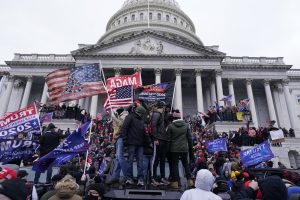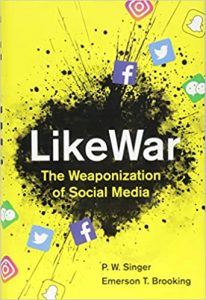Freedom of Speech vs Sedition
Gajarajan Nagarajan | January 29, 2021

2021 storming of the United States Capitol
Ideas that offend are getting more prominent due to divisive and hateful rhetoric harvested by major political parties, their associated news channels and ever growing, unmonitored social media platforms. As US is reeling over recent storming of US Capitol, passionate debates have commenced across the country on who can be the enforcers? Freedom of speech does have its limits as against threats, racism, hostility violence including acts of sedition. Hate crime laws are constitutional so long as they punish violence or vandalism.
US First amendment protects all types of speech and hence hate speech gets amplified in the new digital era with millions of followers can get induced or get swayed by propaganda. Under the first amendment, there is no such thing as a false idea. However pernicious an opinion may seem; we depend for its correction not on the conscience of judges and juries but on the competition of other ideas.
Weaponization of Social Media

Jan 6th event at US Capitol did trigger an important change across all major social media companies and their primary cloud infrastructure providers. Twitter, Facebook, YouTube, Amazon, Apple and Google banned President Trump and scores of his supporters from their platforms for inciting violence. How big will this challenge remain going forward? Aren’t these companies the original enablers and accelerators with no effective control for violence prevention? Should large media companies take law onto their own hands (or their platforms) while state and federal governments take a pause in moderation? Or is this something that needs action by societies as we the people are the cause of the pervasive and polarizing content creators of conspiracy theories in American Society?
Private companies have shown themselves able to act far more nimbly than our government, imposing consequences on a would-be tyrant who has until now enjoyed a corrosive degree of impunity. But in doing so, these companies have also shown a power that goes beyond that of many nation-states and without democratic accountability. Technology companies have employed AI/ML and NLP tools to help generate more visitors and longer duration of engagement of users in their platforms which has been a breeding ground for hate groups. Negative aspects of this unilateral power exercised by technology companies can become precedent only to be exploited by the enemies of freedom of speech around the world. Dictators, authoritative regimes and those in power can do extreme harm to democracy by colluding or forcing technology companies to bend the rules to satisfy their political gain.
In a democratic government, public opinion impacts everything. It is all important that truth should be the basis of public information. If public opinion is ill formed – poisoned by lies, deception, misrepresentations or mistakes; the consequences could be dire. Government, which is the preservative of the general happiness and safety, cannot be secure if falsehood and malice are injected to rob confidence and trust of the people
Looking back into history combined with data science may provide some options to protect future of our democracy.
- The Sedition Act of 1918 covers broad range of offenses, notably speech and expression of opinion that cast the government or the war effort in a negative light. In 2007, a bill named “Violent Radicalization and Homegrown Terrorism Prevention Act” was sponsored by Representative Jane Harman (Democrat from California). The bill would have amended Homeland Security Act to add provisions to prevent and control homegrown terrorism and also establish a grant program to prevent radicalization. Congress can be enabled to revisit above bill with bipartisan support.
- Section 3 of the 14th Amendment provides guidelines including prohibition of current or former military officers, along with current and former federal and state public officials from serving in variety of government offices if they shall have engaged in insurrection or rebellion against the United States Constitution
- Social media bans are key defense mechanisms and needs to be nurtured, enhanced and implemented across all democratic nations and otherwise. Ability to drive conversation, reaching wider audiences for recruitment and perhaps more important benefit of monetization of anger and distrust by conflict entrepreneurs are effectively neutralized with strong enforcement of social media ban.
- Consumer influence on large companies have major role in regulating nefarious online media houses. For example, de-platforming pressure to turn off cloud and app store access to Parler (competitor to Twitter); pressure on publishing houses to block book proposals and FCC regulation on podcasts may provide manageable impact for both extreme left and right wing fanatism and fear mongering.
Photo credits:
https://www.latimes.com/world-nation/story/2021-01-15/capitol-riot-police-veterans-extremists
https://www.amazon.com/LikeWar-Weaponization-P-W-Singer/dp/1328695743
